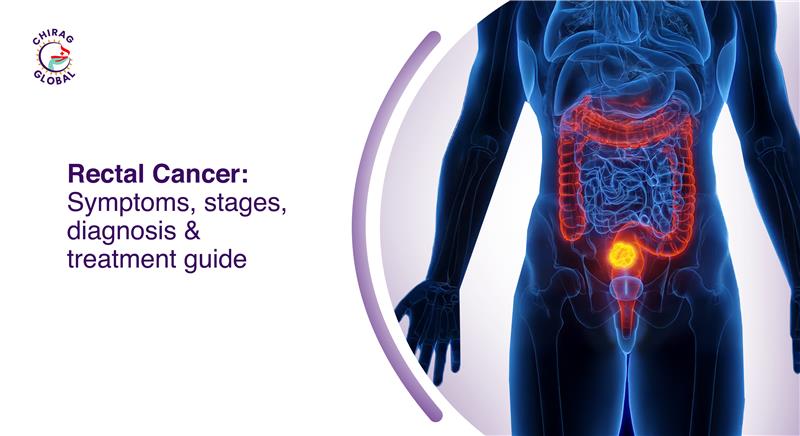Cancer is one of the most concerning health challenges of our time, and among its many types, rectal cancer has gained growing attention due to its rising incidence worldwide. The rectum, which forms the last few inches of the large intestine before the anus, plays a crucial role in waste elimination. When abnormal cell growth occurs in this region, it can develop into rectal cancer.
According to the World Health Organisation (WHO), colorectal cancer (which includes cancers of the colon and rectum) is the third most common cancer globally. Early diagnosis and timely treatment significantly improve survival rates. Unfortunately, many cases are detected late, often because symptoms are overlooked or misunderstood.
In this blog, we will walk you through everything you need to know about rectal cancer, its development, symptoms, diagnosis, treatment, staging, and risk factors. By the end, you’ll have a clearer understanding of how to recognise signs early and why timely medical care is vital.
Learn (What You Need to Know)
What is Rectal Cancer?
Rectal cancer is a form of cancer that begins in the rectum, the final section of the large intestine. It typically develops from polyps, small growths that form on the inner lining of the rectum. Not all polyps turn cancerous, but certain types, like adenomatous polyps, can progress into cancer over time.
Rectal cancer is closely related to colon cancer, but treatment approaches may differ because of the rectum’s location near the anus and surrounding organs.
Key Aspects of Rectal Cancer
- Location: Affects the rectum (last 12 cm of the colon).
- Development: Usually begins as noncancerous polyps.
- Progression: Can invade deeper tissues and spread (metastasize) to other organs.
- Treatment sensitivity: Requires different treatment plans compared to colon cancer due to its anatomical position.
Development of Rectal Cancer
The development of rectal cancer is usually a slow process:
- Polyp formation — Small abnormal growths appear in the rectal lining.
- Dysplasia — Some polyps undergo precancerous changes.
- Carcinoma in situ — Abnormal cells remain confined to the rectal lining.
- Invasive cancer — Cancer spreads beyond the lining into deeper layers, possibly reaching lymph nodes or distant organs.
Lifestyle factors, genetics, and age can accelerate this progression.
Symptoms of Rectal Cancer
Rectal cancer often presents subtle or overlooked symptoms. Being aware of them can aid in early detection.
- Changes in bowel habits (persistent diarrhoea, constipation, or narrow stools)
- Blood in stool (bright red or dark)
- Rectal bleeding
- Abdominal discomfort or cramping
- Unexplained weight loss
- Weakness or fatigue
- Sensation of incomplete evacuation after a bowel movement
Note: These symptoms can also be caused by conditions like haemorrhoids, but persistent signs should always be evaluated by a doctor.
Bleeding should never be ignored. The patient should immediately consult a Proctologist for a proper examination and confirm the diagnosis.
At Chirag Global Hospital, Video Rectoscopy (VRS) is performed as part of the OPD procedure for every new patient. After a digital per rectal examination, a small proctoscope is inserted, and a pen-like camera connected to a phone captures a clear image. These images not only confirm the diagnosis but also help patients understand their condition better. Many cancers have been detected early at our hospital using this simple yet highly effective clinical examination method.
Summary
- Rectal cancer is a serious but treatable condition when detected early.
- Symptoms like rectal bleeding, blood in stool, and changes in bowel habits should never be ignored.
- Diagnosis relies on colonoscopy, biopsy, and imaging tests.
- Treatment involves surgery, chemotherapy, radiation, and modern therapies.
- Prevention includes regular screening, a healthy diet, and lifestyle changes.
Seeking timely medical attention can make all the difference. For expert evaluation and treatment, you can consult the specialists at Chirag Global Hospitals, where advanced care meets patient-focused treatment.
Visit us to know more about: Rectal Cancer





Comments